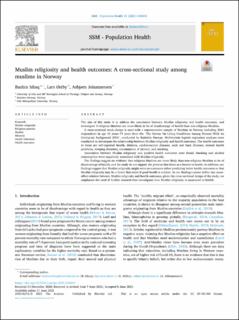| dc.contributor.author | Ishaq, Bushra | |
| dc.contributor.author | Østby, Lars F. | |
| dc.contributor.author | Johannessen, Asbjørn | |
| dc.date.accessioned | 2022-02-28T09:15:03Z | |
| dc.date.available | 2022-02-28T09:15:03Z | |
| dc.date.created | 2021-12-20T10:35:55Z | |
| dc.date.issued | 2021-06-14 | |
| dc.identifier.issn | 2352-8273 | |
| dc.identifier.uri | https://hdl.handle.net/11250/2981617 | |
| dc.description.abstract | The aim of this study is to address the association between Muslim religiosity and health outcomes, and investigate if religious Muslims are more likely to be of disadvantage of health than non-religious Muslims. A cross-sectional study-design is used with a representative sample of Muslims in Norway including 2661 respondents in age 16 years–74 years from the “The Survey On Living Conditions Among Persons With An Immigrant Background 2016”, conducted by Statistics Norway. Multivariate logistic regression analyses were conducted to investigate the relationship between Muslim religiosity and health outcomes. The health outcomes in focus are self-reported health, diabetes, cardiovascular diseases, neck and back illnesses, mental health problems, sleeping disorders, consumption of alcohol, and smoking. Association between Muslim religiosity and positive health outcomes were found. Smoking and alcohol consumption were negatively associated with Muslim religiosity. The findings suggest no evidence that religious Muslims are more likely than non-religious Muslims to be of disadvantage of health, and the study do not support the premise that Islam as a barrier to health. In addition, our findings suggest that Muslim religiosity might serve as a resource either predicting better health outcomes or that Muslim religiosity may be a factor that exists if good health is evident. As our findings cannot define any cause-effect relation between Muslim religiosity and health outcomes, given the cross-sectional design of the study, we emphasize the need of further research that investigates how Muslim religiosity is associated to health. | en_US |
| dc.language.iso | eng | en_US |
| dc.publisher | Elsevier | en_US |
| dc.relation.ispartofseries | SSM - Population Health;Volume 15, September 2021, 100843 | |
| dc.rights | Attribution-NonCommercial-NoDerivatives 4.0 Internasjonal | * |
| dc.rights.uri | http://creativecommons.org/licenses/by-nc-nd/4.0/deed.no | * |
| dc.subject | Muslim religiosity | en_US |
| dc.subject | Religious practices | en_US |
| dc.subject | Muslims | en_US |
| dc.subject | Minorities | en_US |
| dc.subject | Health indicators | en_US |
| dc.subject | Health outcomes | en_US |
| dc.title | Muslim religiosity and health outcomes: A cross-sectional study among muslims in Norway | en_US |
| dc.type | Peer reviewed | en_US |
| dc.type | Journal article | en_US |
| dc.description.version | publishedVersion | en_US |
| dc.rights.holder | © 2021 The Authors | en_US |
| dc.source.articlenumber | 100843 | en_US |
| cristin.ispublished | true | |
| cristin.fulltext | original | |
| cristin.qualitycode | 1 | |
| dc.identifier.doi | https://doi.org/10.1016/j.ssmph.2021.100843 | |
| dc.identifier.cristin | 1970423 | |
| dc.source.journal | SSM - Population Health | en_US |
| dc.source.volume | 15 | en_US |
| dc.source.pagenumber | 1-7 | en_US |

